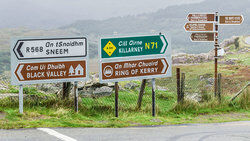
Gaelic is an early Celtic language spoken in Scotland and Ireland. However, while both languages are called Gaelic, they each have their own unique flavor. To broaden your language horizons, learn some fun and interesting Scottish and Irish Gaelic words. Then, find out where you can learn more about the language along with a short history.
Speakers of Gaelic Language
Today, there are approximately 60,000 speakers of Scottish Gaelic and over 73,000 speakers of Irish Gaelic. Both languages are currently in decline, as every successive generation produces fewer fluent speakers. The active regions of Scottish Gaelic are primarily in the northernmost regions of Scotland, whereas Irish Gaelic is mostly concentrated in the western parts of the Republic of Ireland.
The Difference Between Scottish and Irish Gaelic
Linguistically, Scottish Gaelic and Irish Gaelic are closely related. However, speakers of one language are not likely to understand the language of the other. For example, there are three dialects of Irish Gaelic:
- Munster
- Connacht
- Ulster
Also, the Scottish call their language Scottish Gaelic. In Ireland, Irish Gaelic is simply called Irish.
Pronunciation and Phonetics
One of the main distinctions between these two languages is their pronunciation. While these languages share spellings of many words, the way they’re pronounced is different. For example, the Scottish pronounce “Gaelic” as GAA-lik, whereas the Irish say GAY-lik, even though the word is spelled the same way.
Accent Marks
The use of accent marks is also different within the languages. For example, Scottish Gaelic words’ accent marks (grave accent) always angle downwards from left to right. In Irish Gaelic, the síneadh fada diacritic mark (also known as the long accent or acute accent) is the opposite, angled upwards from left to right.
Popular Scottish Gaelic Words and Phrases
The Scots have some fun phrases and popular words that travelers and advanced speakers alike can enjoy! Try some of these Scots Gaelic words on for size.
- Slainte! (slan-juh) - Cheers! (said while enjoying a whisky)
- Madainn mhath (mateen va) - Good morning
- Chan eil (chan yayl) - No
- Tha (ha) - Yes
- Salinte mhath! (slan-juh va) - Good health
- Halo (hello) - Hello
- Feasgar math (fesker ma) - Good evening
- ‘S e ur beatha (share behe) - You’re welcome
- Tha mi duilich (ha mi doolich) - I’m sorry
- Alba (Albah) - Scotland
- Ciamar a tha sibh (kemar aha shiv) - How are you?
- Tapadh leibh (tapa leev) - Thank you
- Tha gu math (ha goo ma) - Fine
- Is math sin (sma shin) - That’s good
Popular Irish Gaelic Words and Phrases
Explore some popular Irish Gaelic words and phrases that are just fun to say! Remember different dialects will have their own phrases but here are a few common sayings.
- Failte (fawl-cha) - Welcome
- Dia duit! (JEE-uh ditch) - Greetings!
- Slan (slawn) - Goodbye
- Le do thoil (lat a han) - Please
- Go raibh maith agat (guh ruh mah a-gut) - Thank you
- Conas ata tu (kun-ass a-taw too) - How are you?
- Maith (moth) - Good
- Ta failte romhat (taw fawil-cha roh-ot) - You are welcome
- Athair (ah-her) - Father
- Mathair (maw-her) - Mother
- Adh mor ort (ah more ort) - Good luck
- Eire (Ay-ra) - Ireland
- Gabh mo leithsceal (guh muh leh-shkayl) - Excuse me
Online Resources for Gaelic Words
When it comes to learning Gaelic words and phrases in both Scottish and Irish, online resources can be really useful. Wherever your interest in Gaelic words stems from, you should be able to find information that is useful in the website references listed below:
- A Beginner's Guide to Irish Gaelic Pronunciation – This site has detailed linguistic information on the language rules of Irish Gaelic. Divided into categories such as vowels, consonants, diphthongs, accents, double consonants, and exceptions, this page covers a wide range of information in a clear, concise format.
- Gaelicmatters.com – This website includes information for learning the language along with quick guides for common words and pronunciation.
- Irish Phrases - Ireland Information has an extensive list of Irish phrases that deal with days of the week, months, years, colors, numbers, everyday greetings, and much more. The site lists the phrase, how it is pronounced, and the meaning.
- LearnGaelic - Those looking to learn Gaelic will find helpful tips and lessons that help them dive right into the language. A beginning test will tell you where you should start.
Other Ways to Study the Gaelic Language
There are many resources available to study Gaelic. Libraries and museums whose collections pertain to Scotland and Ireland will sometimes feature manuscripts or other historical information on Gaelic words.
Explore some of the cultural institutions in your area, including colleges and universities, to see if you can uncover more resources with which to study the Gaelic languages.
Origins of the Gaelic Language
Gaelic finds its roots in the Celtic language, which came from the Celts as early as 1500 BC. It’s a traditional language of Ireland that migrated to Scotland with the Gaels. The Gaels are often the group of people associated with the origins of the Gaelic branch of the Celtic language.
Over time, the language itself has morphed into Irish, Scottish and Manx Gaelic. While they all come from the same Celtic root language, the three languages are unique and distinct.
It’s All Gaelic
Whether you’re speaking Irish Gaelic or Scottish Gaelic, both languages have interesting pronunciations and history. Now that you know a little about Gaelic, advance your language studies by exploring the extinct languages of Asia.